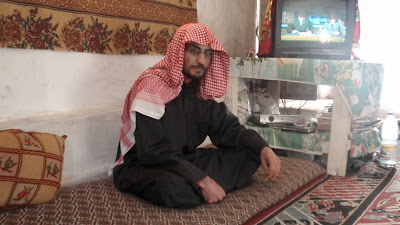
We left Ni'imet's home and Khalid drove us into an area of narrow, winding streets with street vendors selling produce along it's main thoroughfare. We had to ask directions to Wisam's home many times, ending up driving back and forth until Maha called Wisam on his cell phone and he met us at a easy to find location.
The young man who met us was thin and with sharp features. He joined us in the taxi to lead us up the hill through even more narrow streets to his flat.
Wisam lives with two other single men - one in his mid-thirties like Wisam, the other in his 60's. Neither of the other two were home and I asked if they were working, Wisam told me that the older man had worked in casual employment as a security guard for a while but now had no work and that the other young man had been working for a while, gathering scrap metal for recycling, but he had been questioned by the police so quit out of fear of being arrested. Wisam has no work because of this same fear. I ask what he does with his days. "I watch tv or read books. Sometimes I visit friends. Of course, I am bored."
He had been in the university and only had one year left until he would have gotten his degree in history but his education ended when he had to flee Iraq. He would like to finish and get his degree but, he added wistfully, "It is too expensive here."
Wisam was living in Basra and worked as a policeman. His life was shattered in 2004 when he and his fellow police officers were on their way to work together in a shared car. They were attacked by militia who threw bombs at their car and a barage of gunfire. His two colleagues in the front seat were killed. Wisam escaped death because he was sitting between two others in the back seat. Wisam threw himself from the car and lay motionless on the ground. His ruse to get the militia to think him already dead worked. But he was injured badly. He endured two gun shot wounds - one to his leg and the other to an arm. Shrapnel pocked his face and one piece still resides in one of his eyes. The doctor told him that removing it would risk damaging the eye further.
He soon found out that the militia had realized their mistake and that his name was on their hit list. He went to the Brittish military and begged for protection. They agreed to protect him but only on the condition that he provide them with intelligence. Because he felt he had no option if he were to live, he agreed and worked with them for two months. But he was still receiving threats and there was no evidence that the Brits were protecting him. He went to another part of Basra, hoping to stay with family there, but when he got there he discovered they had all left and no one knew where they had gone. He then fled to Jordan.
He told us, "I want to return to my country; I don't want to be out of Iraq" But he speculates that, at best, it will take at least ten years for the situation to improve enough for him to consider returning.
In the meantime, he says, "I most need immigration to another country. I want to work. I want to have a family, to marry, to have kids. I want to be able to plan for my future. I have no future here. It's impossible for me to return to Iraq and there's no future for me here"
Wisam is typical of many young men here: their educations disrupted with no way of completing them or, and they cannot consider marrying and having a family because they cannot work to provide for them. Relying on charity for survival; they have diminished senses of dignity nd self-worth.
Many have suffered serious injury or trauma of attempted assasinations and kidnapping. They fled Iraq, fearing for their lives and found their lives here are also dominated by a diferent sort of fear - fear that they will have no future. Some say that they feel as if they are caged in.
We need to continue to insist on an end of the US occupation of their country so that these young men can return to be a part of recovering their birthright and building the future of their country as well as for themselves. And, for those like Wisam who may have to wait a long time before Iraq is safe for them to return to, we need to do all in our power to make certain they have education and employment opportunities in their temporary countries.



